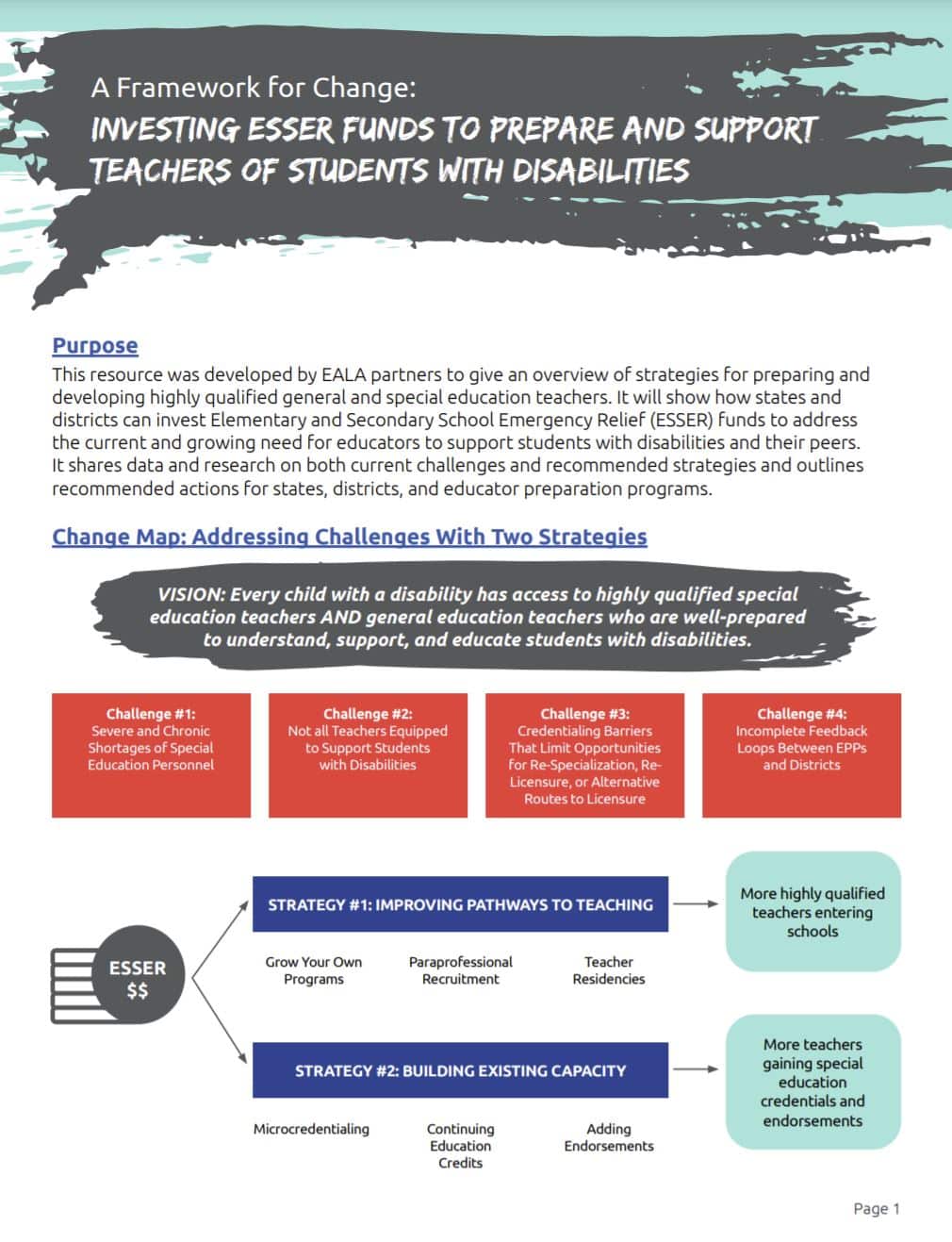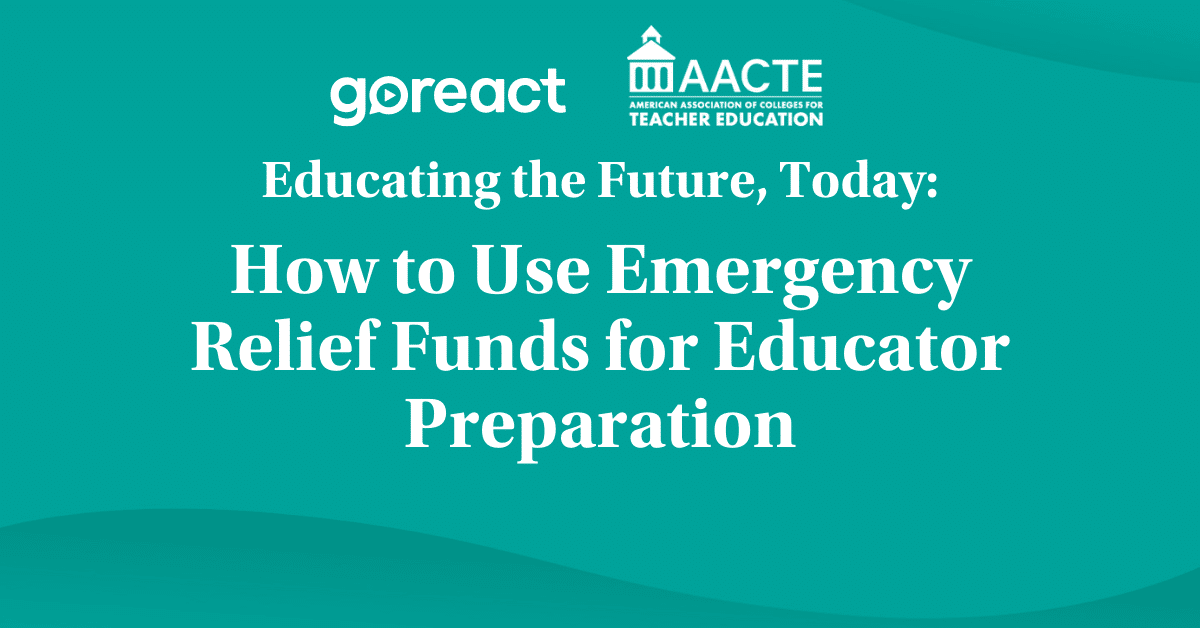01 Feb2022
By Anna Merod
This article originally appeard in K12 Dive and is reprinted with permission.
Dive Brief:
- Supporting teacher prep programs through regulatory relief is key to addressing the ongoing teacher shortage that is impacting districts nationwide, said Linda Darling-Hammond, president and CEO of the Learning Policy Institute, during EdPrepLab’s Second Annual Virtual Policy Summit
- One potential pending policy solution is the EDUCATORS for America Act, introduced by Sen. Jack Reed, D-R.I., and Rep. Alma Adams, D-N.C., in December to invest $1 billion annually for states to enhance teacher preparation programs and provide grants for strategies to meet K-12 workforce needs, said Lynn Gangone, president and CEO of the American Association of Colleges for Teacher Education.
- Funds from the $122.7 billion awarded to school districts nationwide through the pandemic-relief American Rescue Plan can also be used to fuel innovative, collaborative solutions between higher education and K-12 leaders to fix teacher shortages, according to Roberto Rodriguez, assistant secretary at the U.S. Department of Education’s Office of Planning, Evaluation and Policy Development.
28 Jan2022
By Jacqueline Rodriguez
 AACTE joined the Educating All Learners Alliance (EALA) in 2020 as the pandemic gave rise to the growing challenges to teaching students with learning differences online. The Alliance steadfastly supports PK-20 students through resource development, including the newest resource: A Framework for Change: Investing ESSER Funds to Prepare and Support Teachers of Students With Disabilities.
AACTE joined the Educating All Learners Alliance (EALA) in 2020 as the pandemic gave rise to the growing challenges to teaching students with learning differences online. The Alliance steadfastly supports PK-20 students through resource development, including the newest resource: A Framework for Change: Investing ESSER Funds to Prepare and Support Teachers of Students With Disabilities.
This resource was developed by EALA partners to give an overview of strategies for preparing and developing highly qualified general and special education teachers. It will show how states and districts can invest Elementary and Secondary School Emergency Relief (ESSER) funds to address the current and growing need for educators to support students with disabilities and their peers. It shares data and research on both current challenges and recommended strategies and outlines recommended actions for states, districts, and educator preparation programs.
25 Jan2022
By Brian Blackley
In 2021, AACTE supported a federal application by the State of Tennessee and member institution Austin Peay State University (APSU) to create educator preparation-based Grow Your Own programs as acceptable apprenticeships for aspiring educators. After rigorous review and meetings with state and federal officials, AACTE endorsed the effort, which partners college or university educator preparation programs (EPPs) with local school districts to ensure teacher candidates are profession-ready upon entering the classroom.
Paving the way for teaching and educator workforce development nationwide, the Tennessee Department of Education announced it has pioneered a new way to develop teacher pipelines, and is the first state to be approved by the U.S. Department of Labor to establish a permanent Grow Your Own model, with Clarksville-Montgomery County School System and Austin Peay State University’s Teacher Residency program becoming the first registered apprenticeship program for teaching in the country. Tennessee is the first state in the country to sponsor Teacher Occupation Apprenticeship programs between school districts and Educator Preparation Programs (EPPs), which will further the state’s and nation’s efforts to extend the teacher pipeline and address teacher shortages.
24 Jan2022
By Kaitlyn Brennan
 It was another busy week in Washington as lawmakers prepared for the congressional recess the following week. Conversations are heating up behind the scenes surrounding FY22 appropriations and a new iteration of the Build Back Better Act. Advocacy work will be critical in the coming weeks to ensure the historic proposals for education funding are included in both pieces of legislation.
It was another busy week in Washington as lawmakers prepared for the congressional recess the following week. Conversations are heating up behind the scenes surrounding FY22 appropriations and a new iteration of the Build Back Better Act. Advocacy work will be critical in the coming weeks to ensure the historic proposals for education funding are included in both pieces of legislation.
18 Jan2022
By Jean Cook and Shanderia Minor
The MDE is using American Rescue Plan Elementary and Secondary School Emergency Relief (ESSER) funds to cover the grants.
The MTR will provide grants to the universities’ educator preparation programs to enroll diverse participants to work toward their graduate degree and Mississippi teacher certification. MTR will include training alongside a mentor teacher, testing support, professional development, ongoing assessment and a commitment to teach in a geographical critical shortage school or district serving low-income children, racial/ethnic minorities and children with disabilities disproportionately impacted by COVID-19.
10 Jan2022
By Kaitlyn Brennan
This weekly Washington Update is intended to keep members informed on Capitol Hill activities impacting the educator preparation community. The views expressed in this post do not necessarily reflect the views of AACTE.
 As we begin the new year with hope for brighter days ahead, the congressional outlook has remained much the same as last year. This week the House is not in session, but the Senate is. Several members faced delays making their way back to Capitol Hill after the holiday break in the midst of the first D.C. snowstorm of the new year. The travel delays, coupled with the memorializing of former Senate Democratic Leader Harry Reid, and marking the anniversary of January 6 filled much of the week on the Hill.
As we begin the new year with hope for brighter days ahead, the congressional outlook has remained much the same as last year. This week the House is not in session, but the Senate is. Several members faced delays making their way back to Capitol Hill after the holiday break in the midst of the first D.C. snowstorm of the new year. The travel delays, coupled with the memorializing of former Senate Democratic Leader Harry Reid, and marking the anniversary of January 6 filled much of the week on the Hill.
29 Dec2021
Reversing the Trend of a Declining Educator Workforce is Going to Take a Bold National Strategy
By Mark A. Nook
 This article originally appeared in the Des Moines Register and is reprinted with permission.
This article originally appeared in the Des Moines Register and is reprinted with permission.
Our nation’s economic prosperity, global competitiveness, and civic vitality rely on a strong educational system. As the leading producer of educators in the state of Iowa, at the University of Northern Iowa we know a highly qualified and diverse educator workforce is critical for preparing each generation to lead their workplaces and communities while serving as role models at home.
21 Dec2021
By Jane E. West and Kaitlyn Brennan
This blog post is written by AACTE consultant Jane West and is intended to provide updated information. The views expressed in this post do not necessarily reflect the views of AACTE.

Congress Looks to Head Home for the Holidays Leaving Unfinished Business for Next Year
With the temporary fix to fund the government completed (until February 18) and the debt ceiling extension completed, the one big item left on the agenda for this week for Congress was passing President Biden’s Build Back Better plan. With the House already having passed the bill, the ball was in the Senate court where Majority Leader Schumer (D-NY) had promised a vote before the holidays. That promise evaporated this week as it became clear that it would be impossible to corral all Senate Democrats to vote yes—a requirement for passage. Even after multiple conversations with President Biden and other Senators, Sen. Joe Manchin (D-WV) was unwilling to offer his support for the $1.7 trillion bill. So reluctantly, Senators turned their attention to other matters, such as confirming Biden nominations and considering strategies for securing support for voting rights reform.
21 Dec2021
By Rebecca Griesbach
This article originally appeared on AL.com and is reprinted with permission.
When Wesley Lindsey first met his fourth-grade student, the boy, who is also Black, was reading on a preschool level.
Other teachers had referred the student to special education numerous times and wouldn’t even let him walk in the hallway alone due to behavioral problems.
From fall to spring, Lindsey managed to coach the young boy to nearly a third-grade level. The behavior problems stopped, and the student started mimicking Lindsey in the classroom, telling other students to quiet down and do their work.
17 Dec2021
By Michael Rose

In March, President Joseph Biden signed in to law the American Rescue Plan Act (commonly referred to as ‘ARP’), which included more than $120 billion to help schools safely reopen for in-person learning. The funding can be used in a variety of ways, including to address the nation’s teacher shortage by placing teacher candidates in K12 classrooms. AACTE created a Toolkit to help members navigate conversations with state or local education leaders about using ARP funding for this purpose.
09 Dec2021
Three Westminster College Experts Lay Out Problems and Solutions in Education
By Marilee Coles-Ritchie, Melanie Agnew and Anneliese Cannon
This article originally appeared in The Salt Lake Tribune and is reprinted with permission.

Al Hartmann | The Salt Lake Tribune Students raise their hands in full classroom of 32 students in a Spanish class at South Jordan Middle School in 2017.
A crisis is defined as a time of intense danger when important decisions must be made. It can’t wait!
A few days ago, we read with frustration an article in The Salt Lake Tribune about the substitute teacher crisis in Utah—a direct result of Utah’s severe teacher shortage. The substitute statistics were staggering. Granite School District needed 518 subs at the end of September and couldn’t fill 194 of those positions.
07 Dec2021
By Katrina Norfleet

CNN’s Katie Lobosco recently reported on President’s Biden’s universal pre-K plan that would make preschool available and affordable for six million more children and the resulting challenge of hiring “tens of thousands” of new teachers. In referring to the teaching shortage, Lobosco writes, “The average number of college graduates who completed teacher preparation programs fell 24% between the 2009-10 and 2018-19 academic years, according to the American Association of Colleges for Teacher Education.”
03 Dec2021
By Rangasamy Ramasamy
This opinion article originally appeared in Diverse Issues in Higher Education and is reprinted with permission.
 The demographics of our nation’s PK-12 student body are changing. In fact, a report from the National Center for Educational Statistics (NCES, 2019 as cited in Burden, 2020) projects that by 2027 the Caucasian student population will decrease to 45%, Latinx student population will increase to 29%, and the African American student population will remain at 15%. Thus, tomorrow’s student body will be more diverse than today and that trend is expected to continue. To meet the needs of the future PK-12 student population, educator preparation programs (EPPs) must attract a greater number of diverse candidates to the teaching profession—and that requires advocating for policies that promote diversity in the classroom and address critical teacher shortages.
The demographics of our nation’s PK-12 student body are changing. In fact, a report from the National Center for Educational Statistics (NCES, 2019 as cited in Burden, 2020) projects that by 2027 the Caucasian student population will decrease to 45%, Latinx student population will increase to 29%, and the African American student population will remain at 15%. Thus, tomorrow’s student body will be more diverse than today and that trend is expected to continue. To meet the needs of the future PK-12 student population, educator preparation programs (EPPs) must attract a greater number of diverse candidates to the teaching profession—and that requires advocating for policies that promote diversity in the classroom and address critical teacher shortages.
29 Nov2021
By Joshua P. Starr
Educators Rising, a national Grow Your Own career and technical education (CTE) program that inspires high school students to become educators, announced a partnership with the Arkansas Department of Education to expand to 30 schools across the state, with an emphasis on serving high-needs areas and recruiting diverse students into the profession. The partnership, partially funded through a generous grant from the Walton Family Foundation, more than doubles the potential footprint of the program in the state.
With chapters in all 50 states, Educators Rising offers students the opportunity to develop necessary classroom skills and experience teaching through co-curricular learning and supervised clinical experiences while still in high school. The program can be set up as an extra-curricular activity or as a co-curricular experience and offers a classroom-ready curriculum that can also be implemented at the school level. Educators Rising helps increase teacher diversity through tools and resources designed to address the needs of diverse students and broaden the types of students who explore teaching as a profession.
09 Sep2021
By Jacqueline Rodriguez

In case you missed it, there is another opportunity to learn about how to use ESSER funding to recruit into Educator Preparation Programs (EPP).
As you know, in the past year, Congress has set aside billions for the Elementary and Secondary School Emergency Relief (ESSER) Fund. To help educator preparation programs effectively allocate those funds, AACTE created an Advocacy Toolkit with examples from EPPs across the nation who are expanding their recruitment using federal dollars. In this workshop, GoReact and AACTE put together a panel of national, state, and university teacher preparation professionals. We explored one state—Tennessee—which used ESSER funds to support a statewide Grow Your Own Program to address teacher shortages and diversify the profession.







 AACTE
AACTE  It was another busy week in Washington as lawmakers prepared for the congressional recess the following week. Conversations are heating up behind the scenes surrounding FY22 appropriations and a new iteration of the Build Back Better Act. Advocacy work will be critical in the coming weeks to ensure the historic proposals for education funding are included in both pieces of legislation.
It was another busy week in Washington as lawmakers prepared for the congressional recess the following week. Conversations are heating up behind the scenes surrounding FY22 appropriations and a new iteration of the Build Back Better Act. Advocacy work will be critical in the coming weeks to ensure the historic proposals for education funding are included in both pieces of legislation. As we begin the new year with hope for brighter days ahead, the congressional outlook has remained much the same as last year. This week the House is not in session, but the Senate is. Several members faced delays making their way back to Capitol Hill after the holiday break in the midst of the first D.C. snowstorm of the new year. The travel delays, coupled with the memorializing of former Senate Democratic Leader Harry Reid, and marking the anniversary of January 6 filled much of the week on the Hill.
As we begin the new year with hope for brighter days ahead, the congressional outlook has remained much the same as last year. This week the House is not in session, but the Senate is. Several members faced delays making their way back to Capitol Hill after the holiday break in the midst of the first D.C. snowstorm of the new year. The travel delays, coupled with the memorializing of former Senate Democratic Leader Harry Reid, and marking the anniversary of January 6 filled much of the week on the Hill. This article originally appeared in the
This article originally appeared in the 



 The demographics of our nation’s PK-12 student body are changing. In fact, a
The demographics of our nation’s PK-12 student body are changing. In fact, a 